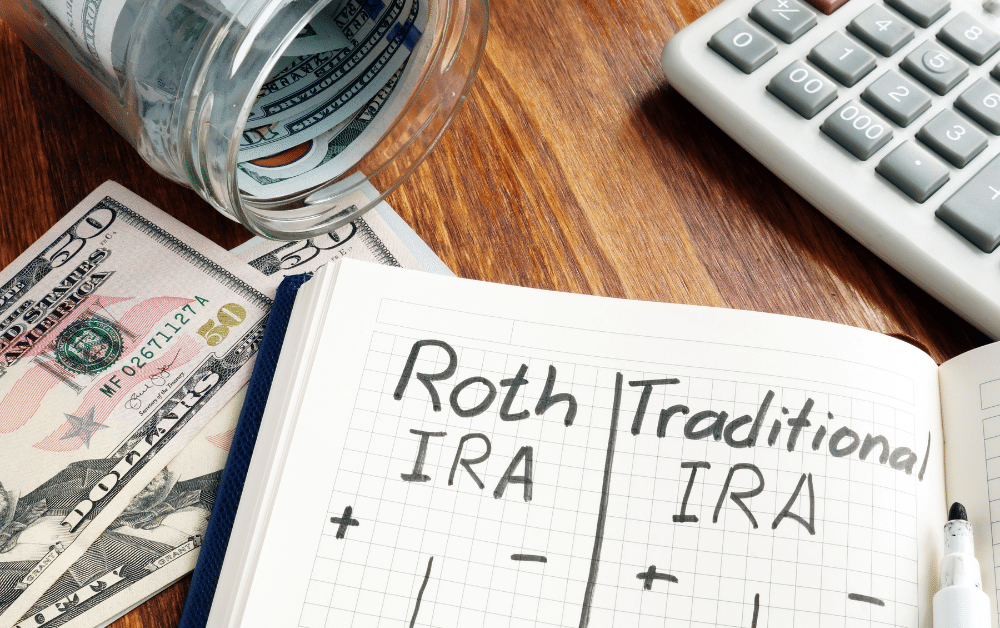Roth IRA for Expats: Rules, Benefits, and Contribution Limits

- Roth IRA Contribution Rules for Expats
- What to Do if the FEIE Disqualifies You From Contributing to an IRA
- How Is MAGI Calculated?
- Which is Better? Roth IRA vs. Traditional IRA for Expats
- Setting Up an IRA While Living Abroad
- IRA Rollover & Moving IRAs Abroad
- FAQs: Common Questions Expats Ask About Roth IRAs
- Still Have Questions Regarding IRAs? Get Help from an Expat Tax Expert
Wondering if you can contribute to a Roth IRA while living abroad? The answer is yes, but with conditions. Understanding the rules is key.
Key Takeaways
- Roth IRA rules for expats are the same as domestic Americans; you can contribute up to a certain annual limit but must have taxable earned income and be below a certain income threshold.
- Because of how expats minimize their US taxes, certain strategies can disqualify them. Specifically, if you exclude all of your income with the Foreign Earned Income Exclusion, you technically have no taxable earned income and are ineligible.
- The 2025 contribution limit is $7,000 or $8,000 if you’re over the age of fifty. Traditional and Roth IRA contributions cannot collectively exceed this amount.
Roth IRA Contribution Rules for Expats
Expats are allowed to maintain both traditional and Roth IRAs. However, some restrictions apply to everyone. While you won’t have to dissolve or transfer your IRA while living abroad, you may be unable to add to it.
Here are the Roth IRA rules:
- You must have taxable salary, wage, or self-employment income (earned income).
- Rental, investment, or any other type of income doesn’t count.
- You can contribute up to $7,000 ($8,000 if you’re over fifty years old) per year. You can’t contribute more than you earned. If taxable earned income is $1,000, then this is your maximum.
- There is no age limit. You can contribute no matter how old you are.
- There is an income limit. If you earn over $146,000 (single filer) or $230,000 (married filing jointly), your maximum contribution phases down. You may not contribute at all after $161,000 (single) and $240,000 (married filing jointly).
The key for expats is whether they have taxable income. All US citizens are required to file a US tax return, regardless of where they live. Greenback Expat Taxes commonly uses a combination of the Foreign Earned Income Exclusion (FEIE), Foreign Tax Credit, and Foreign Housing Exclusion to help clients reduce or eliminate their US tax obligations. Each of these functions differently, but the FEIE in particular interacts poorly with IRA contributions.
Let’s look at a couple of examples:
- Patricia moves to Norway. She’s an occupational therapist earning $80,000 per year. The Foreign Earned Income Exclusion allows Americans to exclude up to $126,500 from their US tax obligation. Logically, Patricia saves herself some money by excluding her entire income from US tax. But with no leftover taxable earned income, she isn’t allowed to contribute to an IRA.
- Lucas, an optometrist, moves to South Korea and earns $150,000. He uses the full FEIE ($126,500) and the standard deduction ($14,600). Afterwards, he’s left with $8,900 in taxable income ($150,000 – $126,500 – $14,600 = $8,900). Since his income is eligible, he may contribute to an IRA.
The most common expat tax strategies include one or more of the Foreign Earned Income Exclusion (FEIE), Foreign Tax Credit, or Foreign Housing Exclusion. Read our linked guides to learn more.
Get the Free Download That Makes Filing Taxes Simple
"*" indicates required fields


What to Do if the FEIE Disqualifies You From Contributing to an IRA
You technically have no taxable earned income if you exclude all your foreign income via the FEIE. So, what are your options? Let’s take a look.
1. Refuse the FEIE
You could choose not to claim the FEIE at all. You aren’t forced to take it, even if you qualify.
This may not be the best choice. Not only will you have to pay US tax, but if you’ve used the FEIE in the past, you’ll have to revoke your election explicitly and will be ineligible to claim it for five years.
2. Claim Only Part of the FEIE
This strategy can be complex, so it’s advisable to consult with an expat tax professional before proceeding.
While the Foreign Earned Income Exclusion (FEIE) generally must be claimed in full if you’re eligible for the entire year, there are situations where you may still qualify to contribute to an IRA, particularly in partial-year scenarios. For example:
- Before qualifying for the FEIE: Income earned while living and working in the US before your foreign assignment is fully taxable and can support IRA contributions.
- Temporary work in the US during the expat period: If you return to the US temporarily and earn income during that time, that income cannot be excluded under the FEIE and may qualify you for IRA contributions.
- After returning to the US: If you move back to the US during the tax year, income earned after repatriation is also eligible for IRA contribution purposes.
These transitional periods can create opportunities for making tax-advantaged retirement contributions, even while living abroad.
3. Traditional IRA to Roth IRA Conversion
In some instances, it may be advantageous to convert traditional IRA funds to a Roth. Again, it’s worthwhile to consult with an expat tax expert beforehand.
High-Earners Roth Contribution Phaseouts
If you earn too much, you’re no longer eligible to make Roth IRA contributions. Here’s how eligibility phases out, according to your modified adjusted gross income (MAGI):
| Filing Status | Maximum Contribution | Reduced Contribution | No Contribution |
| Single | Less than $146,000 | $146,000 to $161,000 | Greater than $161,000 |
| Married Filing Jointly | Less than $230,000 | $230,000 to $240,000 | Greater than $240,000 |
How Is MAGI Calculated?
- Start with your Adjusted Gross Income
- Subtract the following deductions: student loan interest, foreign earned income and housing exclusions, foreign housing deduction, and adoption benefits you excluded from income.
- This is your MAGI
Which is Better? Roth IRA vs. Traditional IRA for Expats
The differences between traditional and Roth IRAs can make your head spin. They seem small, but turn out to be pretty significant.
Here’s the bottom line. Each account taxes you at a different time (now, or during retirement). Since you’ll probably be in a different tax bracket during retirement than right now, the “correct” account is the one that taxes you while you’re in the lower bracket.
A Roth is typically best for early-career professionals, when their income is lower. A traditional IRA is preferable for late-career professionals, when their income is highest. Your specific circumstances may vary.
| Type | Tax Treatment | Tax Benefit | Best for | Contribution Limit | Age limit? |
| Traditional | Taxed on withdrawal, not contribution | When retirement income is less than the present income | Growth and withdrawals are tax-free | $7,000 ($8,000 if 50+) | No |
| Roth | Taxed on contribution, not withdrawal | Growth and withdrawals are tax free | When present income is less than retirement income | $7,000 ($8,000 if 50+) | No |
Setting Up an IRA While Living Abroad
Can expats set up an IRA while living abroad? Yes! However, we strongly recommend choosing a US-based IRA. Foreign investments are taxed differently and come with heavier reporting requirements. Other complications include whether your bank will allow international transfers and whether it prohibits non-US IP addresses.
To set up your IRA, follow these steps:
- Step 1: Choose a US-based brokerage. We recommend Fidelity, Vanguard, or Schwab.
- Step 2: Open an IRA within that brokerage account.
- Step 3: Fund the account.
- Step 4: Choose how to invest the money.
That’s it!
IRA Rollover & Moving IRAs Abroad
When you expatriate, you may be tempted to move everything with you, including retirement accounts. However, it’s not easy to move your accounts overseas. It’s possible but not advisable.
Luckily, IRAs can be maintained remotely and managed abroad, with contributions allowed as long as you meet eligibility requirements. If you’re sure you want to move funds overseas, it’s often simplest to withdraw from your IRA and open a new account in the new country. But remember that you’ll pay US taxes on the converted amount.
Some expats have foreign retirement plans, but be aware of US tax rules. We have tax treaties with many countries that prevent double taxation, but it’s essential to research your specific situation.
FAQs: Common Questions Expats Ask About Roth IRAs
Can I contribute to a Roth IRA if I live overseas?
Yes. If you have US taxable income and are under the maximum MAGI threshold, you are eligible to contribute to a Roth IRA.
What if I already used the FEIE? Can I still contribute?
It depends. If you still have taxable income, you may do so. However, the FEIE often removes your US taxable income altogether, which means you wouldn’t be able to make a Roth contribution.
Do foreign pension contributions impact Roth IRA eligibility?
Yes. Employer contributions to a foreign pension fund count toward your taxable income, while your contribution doesn’t reduce taxable income.
Still Have Questions Regarding IRAs? Get Help from an Expat Tax Expert
Have questions about traditional and Roth IRAs for expats? No problem! We have the answers you need. In fact, we can even help you meet your US tax obligations.
Contact us, and one of our customer champions will gladly help. If you need very specific advice on your specific tax situation, you can also click below to get a consultation with one of our expat tax experts.



